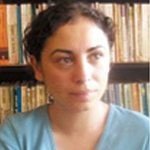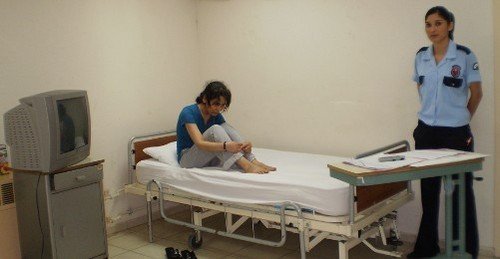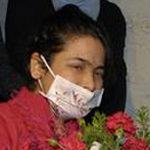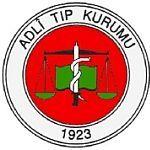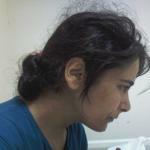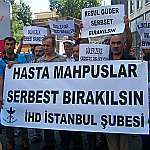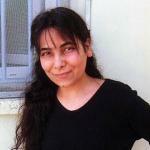Güler Zere is one of several cases of prisoners who are dying of cancer or other terminal illnesses. Their cases have made the newspapers in recent weeks as relatives are calling for their release so they can have a dignified death at home.
President Abdullah Gül has been called on to use his presidential discretion to pardon the prisoners. However, he has responded that for this to happen, he needs to receive the appropriate forensic medical reports.
Recent death in prison
Meanwhile, one prisoner, İsmet Ablak, died of cancer last week in Erzurum prison. The cancer had spread, and Ablak had had around 30 operations, but died in captivity.
His cell mate later wrote a long letter in Ablak's name, and the Taraf newspaper published it. He wrote about how Ablak's aging parents had not been able to come and see him in his last months, and how his sister was only allowed to be with him for three half-hours a day.
Relatives of terminally ill patients in prison and rights activists have argued that treatment for prisoners means a lot of travelling, which exacerbates conditions, less-than-ideal care, as well as inhumane treatment in windowless prisoner rooms in hospital.
Aslan describes the case
Lawyer Oya Aslan visited her client Güler Zere, who has fourth-degree cancer, on 23 July and wrote about her visit:
The Forensic Medical 3rd Specialise Board has decided that political prisoner and fourth-stage cancer patient Güler Zere's sentence will continue in hospital. Conditions in the place where they want her to continue her imprisonment are worse than prison. It is a prison within hospital, no more sterile than prison, without air and people.
Güler is continuously watched by soldiers standing behind the door. Her window, two metres above the ground and barred, faces the hospital's morgue window. Güler knows that she is right next to the morgue and hears the screams of those dying in agony.
Currently she is being fed liquids. Because of her treatment, she may not be given anything by mouth in three weeks. Then her hair will fall out, her skin dry, her voice crack, her hearing fail, middle-ear infection, etc.
All contact made impossible
Güler receives 10 minutes of radiotherapy a day. When she is taken to the oncology department from her ward, gendarmerie officers form a wall around her so that none of her friends or relatives can see her. Even from far, Güler Zere is forbidden to wave at them, have eye contact or smile at them.
Her relatives are allowed to see her for fifteen minutes once a week. However, for her father Haydar Zere to be able to see her, it is not enough to open two iron doors. He needs to apply for permission to the Adana prosecution and to the doctors.
The permit has to be signed by the hospital's judiciary case service, then the administrative service and then by a doctor, if a doctor can be found. Then, if all the signatures are complete, a relative can visit for fifteen minutes, under the surveillance of guards. For her lawyer the same procedure applies.
Her father waits in front of her prisoner's ward day and night, "until she comes out".
We enter the cell to see Güler in an artificial, cold cell smelling of loneliness. She is smiling warmly and embraces those who come with as much strength as she can muster. During this difficult and painful time she tries to write short answers to her friends' letters and read the newspapers.
Taken from Adana to Istanbul
She speaks about the torture of being taken to Istanbul from Adana. After a long journey, she was taken to Bakırköy prison in Istanbul, and was told to take all her clothes off for a body search when entering prison. When she refused, she was taken to a temporary cell by herself. She was not allowed to join others in a cell and when she was cold, she was refused permission to ask for a cardigan from friends.
Güler described her examination at the Forensic Medical Institute thus:
"I was taken to the Forensic Medical Institute. After waiting for some time, I was taken into a room. One of the young doctors took my pulse, listened to my heart beat and asked me if I was fatigued. I said I was. S/he said, 'Well, you have just been operated on', just following procedure. S/he did not look at my wounds or into my mouth. From his/her behaviour I understood that they would not write a positive report. There were several doctors in the room. None of them was interested in me, and they took in another patient while I was still in there. I was not surprised that the report was negative."
Background
Zere's illness started with palatal cancer which spread in her body. The Elbistan prosecution asked the Çukurova University's Forensic Medical Department in Adana for a report. On 22 June, the department said that "Zere can be counted as severely disabled, her life is under severe risk, she depends on the care and observation of others. It is not possible to carry out her intensive and demanding treatment, which includes radiotherapy, under prison conditions. It would be suitable to defer her sentence until she is better."
On 25 June, the prosecution asked whether the hospital's prisoner's ward was suitable and was told that it was not. However, the prosecutor did not accept this report by itself and sent Zere on a 14-hour journey to Istanbul for an examination by the Forensic Medical Institute. The Contemporary Lawyers' Association (ÇHD) has filed a criminal complaint against the prosecutor fort hat reason.
The 3rd specialised committee is headed by Dr. Nur Birgen, a doctor who was handed a six-month suspension from the Turkish Medical Association for failing to report evidence of torture. The suspension was, however, not enforced by her employer, the Ministry of Justice. Birgen's committee ruled that Zere could be treated in the hospital's prisoner's ward.
Zere is thus in the prisoner's ward in Çukurova University's research hospital in Adana.
Prison prosecutors are entitled to suspend prison sentences for prisoners in serious condition based on a report from the Forensic Medical Institue directly, or a report from a fully-equipped hospital that is approved by the FMI. (OA/TK/AG)
*bianet rearranged Oya Aslan's notes and added background information.





